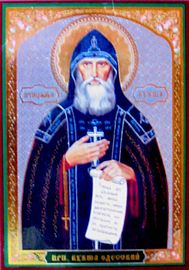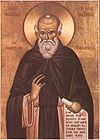September 16 (Eastern Orthodox liturgics)
Appearance

Sep. 15 - Eastern Orthodox liturgical calendar - Sep. 17
All fixed commemorations below celebrated on September 29 by Orthodox Churches on the Old Calendar.[note 1]
For September 16th, Orthodox Churches on the Old Calendar commemorate the Saints listed on September 3.
Saints
[edit]- Saint Sebastiana, disciple of Apostle Paul, martyred at Heraclea (86)[1][2][3][4][note 2]
- Martyr Melitina of Marcianopolis (c. 138-161)[1][6][7][8]
- Great-martyr Euphemia the All-praised, of Chalcedon (304)[1][6][9][10][note 3][note 4]
- Martyrs Victor and Sosthenes at Chalcedon (c. 304)[1][2][4]
- Venerable Dorotheus, hermit of Egypt (4th century)[1][4][11][12]
- New Martyrs Isaac and Joseph, at Karnu, Georgia (808)[1][2][4][13][14]
- Martyr Ludmilla, grandmother of St. Wenceslaus, Prince of the Czechs (927)[1][2][4][15][16][note 5]
Pre-Schism Western saints
[edit]- Saint Cornelius, Pope of Rome (253)[5][17][note 6]
- Hieromartyr Cyprian, Bishop of Carthage (258)[1][5][17][note 7] (see also: August 31 - East)
- Martyrs Lucy and Geminian, a widow and a neophyte martyred together in Rome under Diocletian (c. 300)[17][note 8] (see also: September 17 - East)
- Martyrs Abundius and Abundantius, and John and Marcianus, in Rome (c. 304)[17][note 9][note 10]
- Saint Ninian, Bishop of Whithorn (Candida Casa), Apostle to the Southern Picts (c. 432)[1][2][18][note 11][note 12] (see also: August 26)
- Saint Curcodomus, successor of St Humbert as Abbot of Maroilles Abbey near Cambrai in France (c. 680)[20]
- Virgin-martyr Dulcissima, venerated from time immemorial in Sutri in Italy.[17]
- Saint Eugenia, Abbess of Hohenburg Abbey (735)[17][note 13]
- Saints Rogelius and Servus-Dei, a monk and his young disciple martyred in Cordoba in Spain for publicly denouncing Islam (852)[17][note 14]
- Saint Edith of Wilton, Nun, of Wilton Abbey (984)[1][2][17][19][21][note 15][note 16]
- Saint Stephen of Perugia, third Abbot of St Peter in Perugia in Italy (1026)[17]
Post-Schism Orthodox saints
[edit]- Venerable Kassianos of Glyfia near Alektora, in Cyprus, ascetic.[22][note 17]
- Saint Cyprian, Metropolitan of Moscow and All Russia, Wonderworker (1406)[1][2][4][24][25][26]
- Venerable Kuksha (Velichko) of Odessa, Hiero-Schemamonk of Odessa (1964)[2][4][24] (see also: December 11 - translation of relics)
New martyrs and confessors
[edit]- New Hieromartyr Gregory (Raevskii) of Tver, Priest (1937)[2][4][27][28]
- New Hieromartyr Sergius Losev, Priest (1942)[2][4][24]
Other commemorations
[edit]- Icon of the Mother of God Support of Humble, near Pskov (1420)[2][4][24][29]
- Translation of the relics (2001) of St. Alexis Mechev of Moscow (1923)[2][4][24][note 18]
Icon gallery
[edit]-
St. Melitina of Marcianopolis.
-
Great-martyr Euphemia the All-praised, of Chalcedon.
-
St. Ludmilla of Bohemia.
-
St. Cornelius, Pope of Rome.
-
St. Cyprian, Bishop of Carthage.
-
St Cyprian, Metropolitan of Moscow and All Russia, Wonderworker.
-
Venerable Kuksha (Velichko) of Odessa, Hiero-Schemamonk of Odessa.
Notes
[edit]- ^ The notation Old Style or (OS) is sometimes used to indicate a date in the Julian Calendar (which is used by churches on the Old Calendar").
The notation New Style or (NS), indicates a date in the Revised Julian calendar (which is used by churches on the New Calendar"). - ^ "At Heraclea, in Thrace, St. Sebastiana, martyr, under the emperor Domitian and the governor Sergius. Being brought to the faith of Christ by the blessed apostle Paul, she was tormented in various ways and finally beheaded."[5]
- ^ "At Chalcedon, the birthday of St. Euphemia, virgin and martyr, under the emperor Diocletian and the proconsul Priscus. For faith in our Lord she was subjected to tortures, imprisonment, blows, the torment of the wheel, fire, the crushing weight of stones, the teeth of beasts, scourging with rods, the cutting of sharp saws, burning pans, all of which she survived. But when she was again exposed to the beasts in the amphitheatre, praying to our Lord to receive her spirit, one of the animals having inflicted a bite on her sacred body, whilst the rest licked her feet, she yielded her unspotted soul to God."[5]
- ^ Name days celebrated today include:
- Euphemia (Εὐφημία).
- ^ Princess of Bohemia, entrusted with the education of the young prince St Wenceslas, she was the victim of jealousy and was strangled by hired assassins.[17]
- ^ He was much tried by the heresy of Novatianism and his persecutors exiled him to Civita Vecchia where his sufferings probably hastened his death. St Cyprian refers to him as a martyr. His tomb in Lucina in the cemetery of Callistus still exists.
- ^ Thascius Cecilianus Cyprianus was born in North Africa. He became a lawyer, was converted to Orthodoxy and consecrated Bishop of Carthage in 248. He wrote numerous treatises on theological subjects, one of the most important being De Unitate Catholicae Ecclesiae, and wrote numerous letters. He is one of the greatest Fathers of the Church and he was a model of compassion, discretion and pastoral zeal. Cyprian went into hiding during the persecution of Decius but was arrested and beheaded under Valerian.
- ^ "At Rome, the holy martyrs Lucia, noble matron, and Geminian, who were subjected to most grievous afflictions and a long time tortured, by the command of the emperor Diocletian. Finally, being put to the sword, they obtained the glorious victory of martyrdom."[5]
- ^ The first two were martyred in Rome on the Flaminian Way under the Emperor Diocletian who ordered them to be beheaded together with Marcian, a senator, and John, his son, whom Abundius had raised from the dead.
- ^ "Also, at Rome, at a place on the Flaminian road, ten miles from the city, the holy martyrs Abundius, priest, and Abundantius, deacon, whom the emperor Diocletian caused to be struck with the sword, together with Marcian, an illustrious man, and his son John, whom they had raised from the dead."[5]
- ^ "In Scotland, St. Ninian, bishop and confessor."[5]
- ^ "ST. NINIAN was a native of Britain, but while yet a youth forsook his country and his kindred, and betook himself to Rome. In that city he was thoroughly instructed in the Faith and mysteries of our holy religion, and in course of time consecrated Bishop. Having gained the reputation of a most holy and venerable man, he was sent back to his own country with a special mission to preach to the pagans of the northern parts of the island. His See was established in Galloway, but his apostolate extended to all the Picts who were settled south of the Grampians. There he built a church of stone - a novel sight to the Britons - and dedicated it to St. Martin. Hence the place was called Candida Casa, or Whithern - the White House. In this church the sacred remains of St. Ninian were laid together with those of many other holy men, who, according to St. Bede, repose in the same consecrated earth. Some later writers mention ST. PLEBEIUS as a brother of St. Ninian, and it has been conjectured that he also was buried in the Church of St. Martin."[19]
- ^ Daughter of Adalbert, Duke of Alsace in France, she succeeded her aunt, St Ottilia, as Abbess of Hohenburg.
- ^ "At Cordova, the holy martyrs Rogellus and Servideus, who were decapitated, after their hands and feet had been cut off."[5]
- ^ Daughter of King Edgar and St Wilfrida. She became a nun at Wilton in England at the age of fifteen. She reposed at the age of twenty-two, famous for her generosity to the poor and her familiarity with wild animals.
- ^ "In England, St. Editha, virgin, daughter of the English king Edgar, who was consecrated to God in a monastery from her tender years, whence she may be said to have been ignorant of the world rather than to have forsaken it."[5]
- ^ This Saint is mentioned by the Cypriot historian of the 15th century Leontios Machairas, in his Chronicle, where he writes:
- "Close to the village of Alektora, at a place called Glyfia, there is a tomb of Saint Kassianos as well as his relic, and his memory is celebrated on September 16."
- ^ See: (in Russian) Мечёв, Алексей Алексеевич. Википедии. (Russian Wikipedia).
References
[edit]- ^ a b c d e f g h i j k September 16/September 29. Orthodox Calendar (PRAVOSLAVIE.RU).
- ^ a b c d e f g h i j k l September 29 / September 16. HOLY TRINITY RUSSIAN ORTHODOX CHURCH (A parish of the Patriarchate of Moscow).
- ^ St Sebastiana the Martyr and Disciple of St Paul the Apostle at Heraclea. OCA - Lives of the Saints.
- ^ a b c d e f g h i j k (in Russian) 16 сентября по старому стилю / 29 сентября по новому стилю. Русская Православная Церковь - Православный церковный календарь на 2024 год.
- ^ a b c d e f g h i The Roman Martyrology. Transl. by the Archbishop of Baltimore. Last Edition, According to the Copy Printed at Rome in 1914. Revised Edition, with the Imprimatur of His Eminence Cardinal Gibbons. Baltimore: John Murphy Company, 1916. pp. 285–286.
- ^ a b (in Greek) Συναξαριστής. 16 Σεπτεμβρίου. ECCLESIA.GR. (H ΕΚΚΛΗΣΙΑ ΤΗΣ ΕΛΛΑΔΟΣ).
- ^ Great Synaxaristes: (in Greek) Ἡ Ἁγία Μελιτίνη ἡ Μάρτυς. 16 Σεπτεμβρίου. ΜΕΓΑΣ ΣΥΝΑΞΑΡΙΣΤΗΣ.
- ^ Martyr Melitina of Marcianopolis. OCA - Lives of the Saints.
- ^ Great Synaxaristes: (in Greek) Ἡ Ἁγία Εὐφημία ἡ Μεγαλομάρτυς. 16 Σεπτεμβρίου. ΜΕΓΑΣ ΣΥΝΑΞΑΡΙΣΤΗΣ.
- ^ Greatmartyr Euphemia the All-praised. OCA - Lives of the Saints.
- ^ Great Synaxaristes: (in Greek) Ὁ Ὅσιος Δωρόθεος ὁ ἐν Αἰγύπτῳ ὁ Ἐρημίτης († 4ος αἰ.). 16 Σεπτεμβρίου. ΜΕΓΑΣ ΣΥΝΑΞΑΡΙΣΤΗΣ.
- ^ Venerable Dorotheus the Hermit of Egypt. OCA - Lives of the Saints.
- ^ New Martyr Isaac of Georgia. OCA - Lives of the Saints.
- ^ Zakaria Machitadze (Archpriest). Lives of the Georgian Saints. First English Edition. St. Herman of Alaska Brotherhood, 2006. pp. 332-334.
- ^ Great Synaxaristes: (in Greek) Ἡ Ἁγία Λουντμίλα. 16 Σεπτεμβρίου. ΜΕΓΑΣ ΣΥΝΑΞΑΡΙΣΤΗΣ.
- ^ Martyr Ludmilla the grandmother of St Wenceslaus the Prince of the Czechs. OCA - Lives of the Saints.
- ^ a b c d e f g h i j September 16. Latin Saints of the Orthodox Patriarchate of Rome.
- ^ Great Synaxaristes: (in Greek) Ὁ Ἅγιος Νινιάν (Βρετανός). 16 Σεπτεμβρίου. ΜΕΓΑΣ ΣΥΝΑΞΑΡΙΣΤΗΣ.
- ^ a b Rev. Richard Stanton. A Menology of England and Wales, or, Brief Memorials of the Ancient British and English Saints Arranged According to the Calendar, Together with the Martyrs of the 16th and 17th Centuries. London: Burns & Oates, 1892. p. 448-451.
- ^ St. Curcodomus // Catholic Online
- ^ Great Synaxaristes: (in Greek) Ἡ Ἁγία Edithac (Ἀγγλίδα). 16 Σεπτεμβρίου. ΜΕΓΑΣ ΣΥΝΑΞΑΡΙΣΤΗΣ.
- ^ (in Greek) Όσιος Κασσιανός ο εν τη Γλυφία, παρά της κώμης Αλέκτορα εσκήσας. Ορθόδοξος Συναξαριστής.
- ^ Saint Kassianos of Glyfia, Who Lived in Asceticism in Alectora. Mystagogy Resource Center. September 16, 2015.
- ^ a b c d e (in Russian) 29 сентября (16 сентября). Православная Энциклопедия под редакцией Патриарха Московского и всея Руси Кирилла (электронная версия). (Orthodox Encyclopedia - Pravenc.ru).
- ^ Great Synaxaristes: (in Greek) Ὁ Ὅσιος Κυπριανὸς Μητροπολίτης Κιέβου, Ρῶσος († 1406). 16 Σεπτεμβρίου. ΜΕΓΑΣ ΣΥΝΑΞΑΡΙΣΤΗΣ.
- ^ Repose of St Cyprian the Metropolitan of Moscow and All Russia. OCA - Lives of the Saints.
- ^ (in Russian) ГРИГОРИЙ. Православная Энциклопедия под редакцией Патриарха Московского и всея Руси Кирилла (электронная версия). (Orthodox Encyclopedia - Pravenc.ru).
- ^ New Hieromartyr Gregory (Raevskii) of Tver. OCA - Lives of the Saints.
- ^ Icon of the Mother of God Support of Humble. OCA - Lives of the Saints.
Sources
[edit]- September 29 / September 16. HOLY TRINITY RUSSIAN ORTHODOX CHURCH (A parish of the Patriarchate of Moscow).
- September 16. OCA - The Lives of the Saints.
- The Autonomous Orthodox Metropolia of Western Europe and the Americas (ROCOR). St. Hilarion Calendar of Saints for the year of our Lord 2004. St. Hilarion Press (Austin, TX). p. 69.
- The Sixteenth Day of the Month of September. Orthodoxy in China.
- September 16. Latin Saints of the Orthodox Patriarchate of Rome.
- The Roman Martyrology. Transl. by the Archbishop of Baltimore. Last Edition, According to the Copy Printed at Rome in 1914. Revised Edition, with the Imprimatur of His Eminence Cardinal Gibbons. Baltimore: John Murphy Company, 1916. pp. 285–286.
- Rev. Richard Stanton. A Menology of England and Wales, or, Brief Memorials of the Ancient British and English Saints Arranged According to the Calendar, Together with the Martyrs of the 16th and 17th Centuries. London: Burns & Oates, 1892. p. 448-451.
- Greek Sources
- Great Synaxaristes: (in Greek) 16 ΣΕΠΤΕΜΒΡΙΟΥ. ΜΕΓΑΣ ΣΥΝΑΞΑΡΙΣΤΗΣ.
- (in Greek) Συναξαριστής. 16 Σεπτεμβρίου. ECCLESIA.GR. (H ΕΚΚΛΗΣΙΑ ΤΗΣ ΕΛΛΑΔΟΣ).
- (in Greek) 16/09/2024. Ορθόδοξος Συναξαριστής.
- Russian Sources
- (in Russian) 29 сентября (16 сентября). Православная Энциклопедия под редакцией Патриарха Московского и всея Руси Кирилла (электронная версия). (Orthodox Encyclopedia - Pravenc.ru).
- (in Russian) 16 сентября по старому стилю / 29 сентября по новому стилю. Русская Православная Церковь - Православный церковный календарь на 2024 год.








